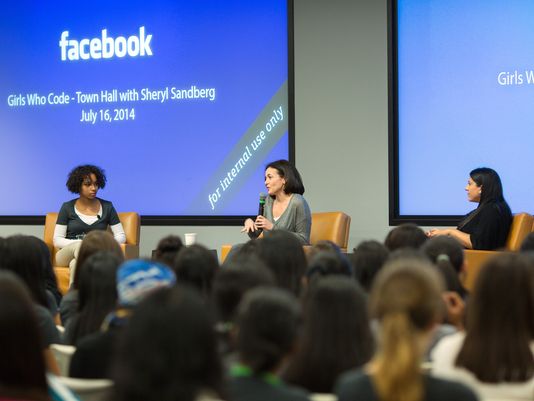Facebook's Sheryl Sandberg on tech's diversity gap
HTTP/1.1 200 OK Server: nginx/1.2.7 Content-Type: text/html; charset=utf-8 Content-Language: en Last-Modified: Wed, 13 Aug 2014 17:06:10 GMT X-UA-Compatible: IE=Edge,chrome=1 X-Secret: cnpudnkgcnpiZXZnbUBoZm5nYnFubC5wYnogbmFxIFYganZ5eSBnZWwgZ2IgdHJnIGxiaCBuIHdiby4= Cache-Control: max-age=20 Expires: Wed, 13 Aug 2014 17:08:25 GMT Date: Wed, 13 Aug 2014 17:08:05 GMT Transfer-Encoding: chunked Connection: keep-alive Connection: Transfer-Encoding
Facebook Chief Operating Officer Sheryl Sandberg, author of best seller Lean In, is one of the leading voices on the diversity gap in Silicon Valley technology companies.
She sat down with USA TODAY to discuss challenges her company and others are confronting. This is a condensed version of the interview.
Q:Why is it important for the technology industry to be more diverse?
A: Endless data show that diverse teams make better decisions. We are building products that people with very diverse backgrounds use, and I think we all want our company makeup to reflect the makeup of the people who use our products. That's not true of any industry really, and we have a long way to go.
Q: Why did Facebook release its diversity data?
A: The issue is not releasing the data. The issue is moving the numbers.
At the broadest level, we are not going to fix the numbers for under-representation in technology or any industry until we fix our education system and until we fix the stereotypes about women and minorities in math and science.
Girls are at 18% of computer science college majors. We can't go much above 18% in our coders if there's only 18% coming into the workplace, and at every level, more boys stay in than girls in every industry. In order to move numbers, we all understand that we have to increase the numbers going into the funnel.
Q: Have the numbers improved since you've been at Facebook?
A: I don't think we have released numbers historically but my gut (says) probably. I certainly have been very focused on them.
Q: Do you have goals and timetables for increasing diversity?
A: Yes, I want half, half, half across the board. Fifty percent.
I would like women to earn 58% of the (computer science) degrees, because women earn 58% of college degrees.
The question is: How as a society do we get there? And how do we stop thinking that's not attainable?
I have been saying this lately: I think we suffer from the tyranny of low expectations.
There was such a big deal made when women won 20% of the Senate seats. All the articles kept saying: Women take over the Senate, women take over the Senate. This is in the last election. Fifty percent of the population with 20% of the seats is not a takeover. It's a problem. Our expectation needs to be 50%.
I also want to be clear we are not on the path to get there. In tech, if women are 18% of the graduates, we are not getting to 50% of the jobs. We have got to change that.
Q: Does Mark Zuckerberg share your passion for these issues?
A: I work for Mark. And everything I do, it's not just that he lets me, it's that he supports me.
He has spoken very, very loudly about how important he thinks all forms of diversity and opportunity are, so I think we are partners in this.
He thinks about this as part of the knowledge economy, that the knowledge economy is about people getting the education they need to really contribute. And that means immigrants, which he is really focused on, women, people of all backgrounds.
Read or Share this story: http://usat.ly/ViKe4w










